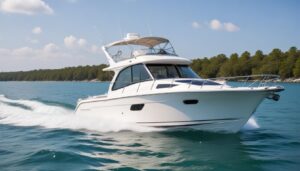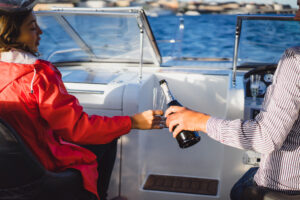In case of an emergency while boating, follow these procedures:
- Stay Calm: Keeping a clear head is essential for making sound decisions during emergencies.
- Assess the Situation: Determine the nature of the emergency (e.g., capsizing, engine failure, medical emergency) and take appropriate action.
- Signal for Help: Use flares, a whistle, or a mirror to signal for help. If you have a VHF radio, call for assistance on Channel 16, the international distress frequency.
- Use Your Life Jacket: Ensure that all passengers are wearing life jackets, especially if the boat is taking on water or capsizing.
- Abandon Ship if Necessary: If the vessel is sinking and you cannot manage to stay aboard, abandon ship and swim to safety. Use the boat as a flotation device if possible.
- Stay Together: If you must abandon the vessel, try to stay close to each other and the boat for visibility and safety.
- Call for Help: If possible, use a cell phone to call for help or use a distress signal device such as an EPIRB (Emergency Position Indicating Radio Beacon).
- Follow Navigation Rules: If your boat is still afloat, follow navigation rules and give way to other vessels in the area while you await rescue.
- Assess Injuries: If there are any injuries, tend to them immediately with first aid if possible. If the injuries are severe, prioritize getting the injured to safety.
- Stay Warm and Hydrated: If you are stranded on a boat or in the water for an extended period, it is crucial to stay warm and hydrated. Use blankets or any available materials to keep warm and ration any water or food you have.
- Stay Visible: If you are waiting for rescue, make sure to stay visible by using flares, waving a bright-colored flag or clothing, and making noise to attract attention.
Emergencies can happen at any time while boating, no matter how experienced or prepared you are. It is crucial to have a plan in place and know what to do in case of an emergency. By following these emergency procedures, you can increase your chances of staying safe and getting the help you need.
The first and most important step in case of an emergency on a boat is to stay calm. Panic can cloud your judgment and lead to mistakes that could worsen the situation. Take a deep breath, assess the situation, and proceed with the following steps.
The next step is to assess the nature of the emergency. Is the boat taking on water? Is there an engine failure? Is someone on board injured? Determining the nature of the emergency will help you take appropriate action.
If you need immediate assistance, signal for help using flares, a whistle, or a mirror. If you have a VHF radio, use Channel 16, the international distress frequency, to call for help. It is essential to have these distress signals on board your boat at all times.
Wearing a life jacket is crucial during an emergency, especially if the boat is taking on water or capsizing. Ensure that all passengers have their life jackets on and properly fastened. If the vessel is sinking and it is no longer safe to stay aboard, abandon ship and use the boat as a flotation device if possible.
If you do abandon the vessel, try to stay together with other passengers and the boat. Staying close to each other and the boat will increase your chances of being seen and rescued. If possible, use a cell phone or an EPIRB (Emergency Position Indicating Radio Beacon) to call for help.
While waiting for rescue, it is essential to follow navigation rules and give way to other vessels in the area. If there are any injuries, prioritize tending to them with first aid. If the injuries are severe, focus on getting the injured to safety.
If you are stranded on a boat or in the water for an extended period, it is crucial to stay warm and hydrated. Use blankets or any available materials to keep warm and ration any water or food you have. Additionally, make sure to stay visible by using flares, waving a bright-colored flag or clothing, and making noise to attract attention.
In conclusion, emergencies can happen at any time while boating, and it is essential to be prepared. By following these emergency procedures, you can increase your chances of staying safe and getting the help you need. Remember to stay calm, assess the situation, signal for help, wear a life jacket, and stay together. Always prioritize safety and follow navigation rules while awaiting rescue. By being prepared and knowing what to do in case of an emergency, you can ensure a safe and enjoyable boating experience.







